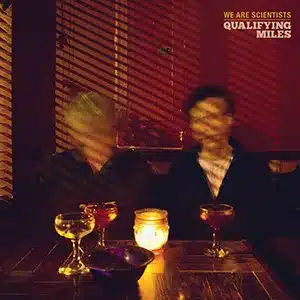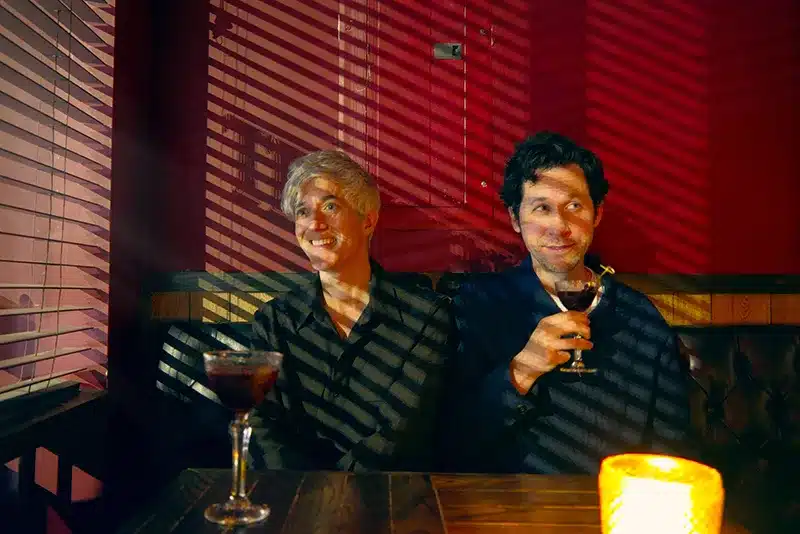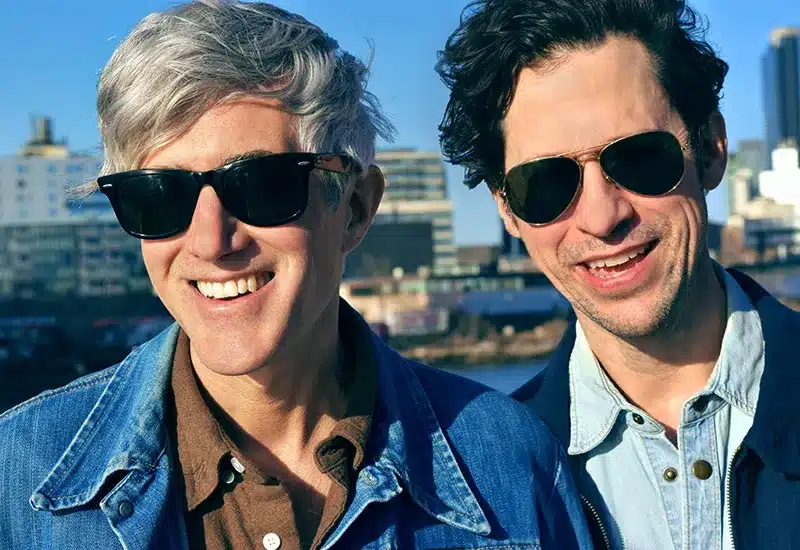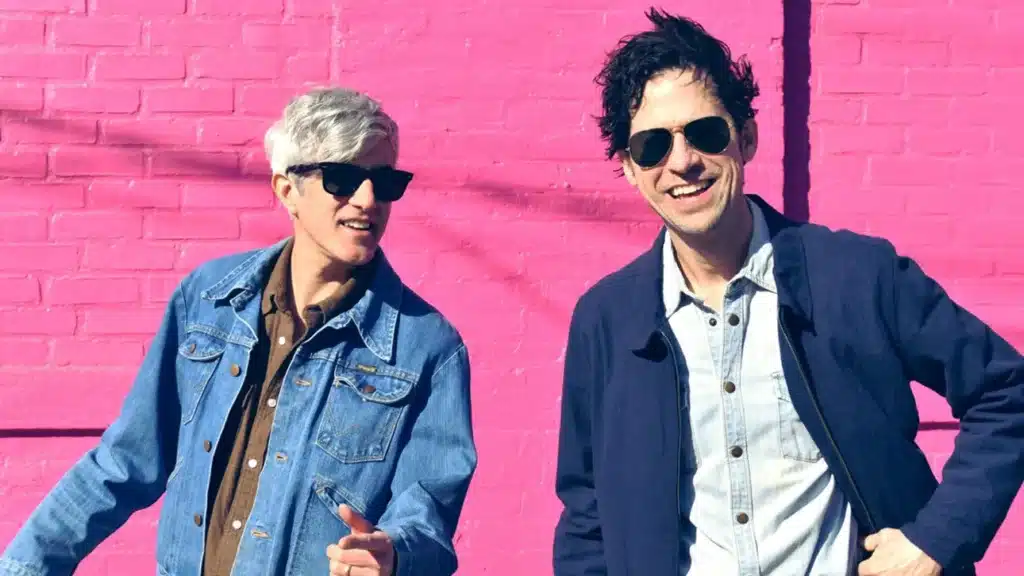
Power-pop underdogs We Are Scientists discuss the 1990s, nostalgia, and bad airport food ahead of the release of their ninth album, Qualifying Miles.
 Qualifying Miles We Are Scientists Grönland 18 July 2025
Qualifying Miles We Are Scientists Grönland 18 July 2025
Originating in Berkeley, California, and now based in New York City, We Are Scientists have been a staple of the indie rock scene for over 20 years. Vocalist/guitarist Keith Murray started his conversation with PopMatters by answering a question about how he and bandmate Chris Cain have managed to maintain a creative, commercial, and platonic relationship for more than 20 years. While the pressures of touring, the public eye, and demanding music labels can be enough to squash many a band (think the White Stripes, Oasis, and Fleetwood Mac—the list is truly inexhaustible), We Are Scientists have found a rare sort of creative symbiosis in their partnership.
“Truly fundamental to our longevity is that Chris and I have remained such good friends throughout all these years,” Murray starts. “When we’re not on tour and we’re not working on We Are Scientists, we absolutely hang out more than any other band I know. Chris and I still absolutely use the band as an excuse to hang out.” He goes on to note that even when returning from a grueling seven-week tour, he and Cain still manage to find reasons to hang out just days later (a feat I don’t think many of us would even dare consider after spending seven weeks touring with even the people we loved the most).

When discussing We Are Scientists, Murray describes a creative and platonic symbiosis that’s difficult to explain beyond its mere existence and its ability to slot so neatly into both his and Cain’s creative and personal lives. By the end of our conversation, We Are Scientists almost struck me as more of a byproduct of a great friendship than some commercially viable creative endeavor two talented musicians might thrust upon themselves in the pursuit of a music career. The ease with which the two can navigate a notoriously fickle and fluctuating industry presents an obvious testament to the group’s continued success.
Still, in any relationship (creatively, platonic, romantic, or otherwise), there’s bound to be some level of disagreement, even if it’s as moot and inconsequential as something like deciding what movie to watch or whether pineapple belongs on pizza (it does not). Murray notes how he and Chris have navigated these inevitable differences of opinion when it comes to creative decisions in We Are Scientists.
As he explains, “I trust his intentions. I’ve known him long enough that I think I understand that even if I disagree with his take on something, I trust him.” Murray goes on to tell me that when working together, there’s never any indication that the other would be trying to pull the project in a direction they didn’t feel would benefit the group creatively as a whole.
When I’d read the title of their upcoming album Qualifying Miles, my mind, perhaps addled by seemingly endless airline commercials and promotional emails touting laughably inconsequential air mile rewards, I thought the title might be an allusion to that, but had to check with Murray to ensure I wasn’t just a commercially optimized frequent flyer trying to thrust my own neurosis onto music. However, much to my pleasure and surprise, the airline allusion is precisely what the group was going for.

Murray tells us that the title of the record came from a sort of “weighing of nostalgia”. The album is not necessarily concerned with being nostalgic, but rather with dissecting what motivates nostalgia in the first place. How and what we decide to apply the rose-colored glasses of sentimentality to can often be elusive even to ourselves. Oftentimes, nostalgia colors unexceptional parts of our lives with a saccharine sentimentality that the reality probably didn’t warrant, while other seemingly tantamount occurrences can quickly fade into our subconscious.
Murray and Cain wanted to investigate why they are nostalgic for certain aspects of their lives, but not for others that arguably have more importance. Murray elaborated, saying he wanted to understand why he wasn’t nostalgic for some people or events in his life that, at the time, seemed to be fundamental pillars of his identity.
Conversely, Qualifying Miles also more directly references the team’s trials and tribulations as Delta frequent flyers. As much as Murray hated to admit that they’re a “Delta-aligned band”, the sunk cost reluctance of their accrued miles keeps them loyal to the airline. Murray jokingly tells me about times the duo have considered switching to another airline, but it appears the Delta lounge’s free snacks and flat beers, paired with free baggage, have a chokehold on the duo. Disappointing airport food aside, the term “qualifying miles” harkens to a kind of “earned” proverbial mileage We Are Scientists has earned through years of touring and creating music together.
As rich a source of inspiration as nostalgia can be for many artists, it always runs the risk of veering into the territory of something maudlin, overly sentimental, and rife with the scourge of selective memory. When Murray is asked how he and Cain balanced those themes of nostalgia, that distilling of a sound of an era, into their record without falling into the proverbial sand trap of nostalgia, Murray notes that anytime We Are Scientists have gone into a project aiming to plumb a specific theme like nostalgia, it’s never really worked for the group. They later find it better to let the project percolate and find their own footing while injecting flavours and tastes of whatever the originally stated concept may have been.
“Between every album, we’d say, ‘Oh, what do we want to do? What do we think our next album should be?’ and we’ve never followed that idea through to its conclusion. We tend not to be led by a concept. We almost always take stock most of the way through a record and then say ‘OK, is there a concept tucked in here we can plumb?’” Murray says the group doesn’t “try to force a hand we’ve crafted for ourselves” to allow themselves a little bit of creative breathing room unburdened by binaries of genre or theme.
As much as the music on Qualifying Miles seems to harken back or acknowledge the influences of that sort of 1990s sensibility, it feels like it’s still very much a product of the present but with some tropes and noodly guitar riffs that might’ve fit into a Pavement song back in the day.

For Qualifying Miles, Murray and Cain leaned more into a “live-in-the-room” production style than on their previous LP, giving the record a raw and frayed edge. Murray tells me, “A lot of the record was experimenting with production.. Going into takes and chopping up takes and purposely creating takes that were inhuman.” We Are Scientists purposely fracture tracks to try to generate something more raw, fresher, and less polished—a sort of sonic kintsugi. Murray even says some intentionally “bad” vocals were still used to give the record a bit of texture that might’ve been absent from their more traditionally “refined” work.
In light of the retrospective nature of the album, Murray was asked if the group ever revisited old material and either recycled or reworked it into the new album. To my surprise, Murray says the group typically avoid doing that, preferring to work with fresh, non-anachronistic lyrics and riffs produced concurrently with the project. For We Are Scientists, “extra” material typically remains in the past. Both Murray and Cain are too eager to write something new in lieu of picking up the carrion of previous works.
Ironically, for an LP of the subtly nostalgic variety, Murray notes that the group typically don’t “look back” (outside of their COVID-era podcast Dumpster Dive, where they revisited some of their old demos). “The writing aspect is the thing we love the most”, Murray says. Murray feels that revisiting old material can diminish the enjoyment of creating something new.
Near the end of our conversation, I asked Murray if the reception of his work or how it was interpreted by an audience ever affected how he’d viewed his own work. Murray notes that he wisely tries to stay out of the comment section quagmire, keenly aware of how it might negatively impact his own output. Cain, on the other hand, can parse through reviews and comments in a way that can help them piece together ideas for their next project. “Chris knows how to shut something down or spur something on,” he notes.
When asked about the role of producers on albums, Murray discussed how former collaborators, such as Ariel Rechtshaid, who worked on the group’s first three albums, possess the rare ability to weave themselves and their creative direction into a record without it feeling intrusive or overtaking the group’s vision. Rechstaid ingrains himself into the creative unit rather than thrusting his vision upon a work. Self-producing their past few records has given the group a different kind of creative capital, allowing them to fully and independently govern the creative direction between the two people who know the group best.


